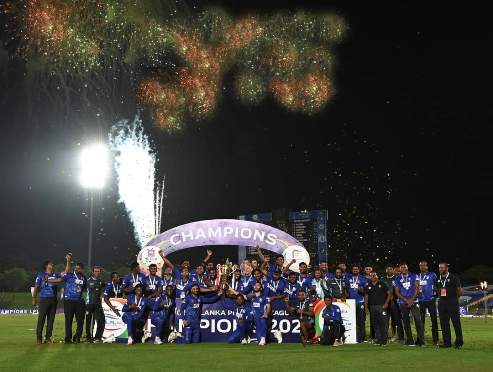Winds of change blowing away pandemic in playing fields
By The Line Judge
Winds of change have been blowing across sports in the island even as the COVID-19 pandemic wreaked havoc bringing most international competitions to a standstill, underscored by the postponement of the Tokyo Olympics by a year. After Sri Lanka went into lockdown interrupting school cricket ‘big matches’, there was optimism that normalcy would return when the Football Federation of Sri Lanka conducted a national level President’s Cup tournament in August. But a spike in the viral outbreak dampened the hopes of the sports loving public.
However, despite this bleak outlook for sports in the country, Sri Lanka Cricket (SLC) managed to stage the inaugural Lanka Premier League (LPL) without spectators in a bio-secure bubble in Hambantota. This has become the new normal worldwide, although New Zealand and Australia conducted cricket and rugby internationals allowing a limited number of spectators.
Whereas the LPL provided the silver lining as dark clouds hovered over the island, Sports Minister Namal Rajapaksa is viewed as the catalyst for the new outlook of sport in the country even playing a proactive role to ensure the LPL became a reality. The young minister who has represented the country in rugby at the highest level is steering a new course to build a healthy sporting nation armed with an extravagant budget at his disposal.
Since becoming the youngest sports minister in Sri Lanka’s history, the 34-year-old has been lauded in all quarters from officials to former players for his prudent policies and dynamic hands-on approach to provide solutions to the perennial ills prevailing in sports in the country. Appointing former Sri Lanka cricket captain Mahela Jayawardene to head the National Sports Council (NSC) along with another cricket legend Kumar Sangakkara is a case in point. “Like to thank Sports council members for committed work on creating a structure and a plan for sports. Very productive meeting in advising Hon minister @RajapaksaNamal and officials. Excited to be part of the vision and mission of sports in SL and challenges ahead,” tweeted Jayawardene recently.
The NSC has the onerous task of drawing up a new Sports Act to replace the archaic 1973 Law, which has been amended on numerous occasions. More significantly Namal made a passionate plea to parents to allow children to engage in sports activities and not consider a career in sports to be a burden unveiling his mission to encourage sports persons to become professionals. He has also made a request to the Minister of Education to increase the school break by 15 minutes for the students to engage in sports. His aim to create a billion-dollar industry and produce sports entrepreneurs has been well documented. Infrastructure development by building playgrounds in each of the 25 districts in the island and focus on high performance facilities for athletes is something close to his heart.
National Sports Associations are now scrambling to get a slice of the unprecedented 2021 budget allocation of Rs 7,000 million allocated for sports. In another novel decision, sports bodies were allocated stadiums to nurture for their national team training with volleyball getting one in Dadella, Galle, rugby in Nawalapitiya and football expected to get the Sugathadasa Stadium. He tweeted that the Urban Development Authority and the Sugathadasa Stadium Management hoped to sign a Memorandum of Understanding (MoU) to further develop this venue, which is a central and unique venue in Sri Lanka for a more sustainable development under a public-private partnership.
As bouquets continued to be showered during the past six months on the youthful sports minister who is all ears in charting a new sports policy for Sri Lanka during challenging times, he must crack the whip at the slightest sign of negligence and failure by corrupt and self-seeking officials for whom glory comes in the seat of power than producing tangible results in the international arena. It has been almost a quarter century since Arjuna Ranatunga led Sri Lanka to victory at the 1996 World Cup while Susanthika Jayasinghe’s Olympic medal came two decades ago at the 2000 Sydney Games. Sri Lankan sports authorities have a habit of living on their past laurels without planning for the future ostensibly due to lack of funds though there is no paucity of talent in the country.
According to some reports, two previous sports ministers had returned about Rs 3 million from their allocated budget denying national sports bodies the necessary funds which could have been availed for development purposes. “We are all volunteers serving the sports for the love of it. Why should we go with a begging bowl to ministry officials,” said an exasperated official. Furthermore, sports ministers have been changing like musical chairs during the past five years. Not only ministers, secretary to the ministry and the director-general of sports also keep changing every time a new minister takes office undoing the work of past officials. Sports associations have to start from scratch to convince the new authorities in power. The lack of continuity is frustrating for all and sundry because everybody has to start all over again.
It is in this context that a proposal by Sri Lanka’s National Olympic Committee president Suresh Subramaniam for the establishment of a National Sports Authority is valid. He wants a body similar to the Sports Authority of India which has permanent officials administering sports and looking after all the associations. “Then it’s easy because there is continuity. What can you do in five years, they must run for 10 years,” he said.
A change in the driver’s seat is welcomed because it comes like a breath of fresh air but the lure of a medal is always constant. You cannot shift the goal post to achieve that goal. On the same token ensuring continuity and consistency in policy decision is also a key ingredient to success.
-ENCL


